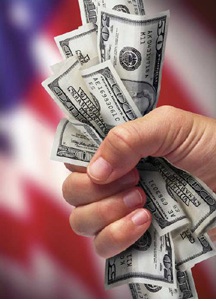…On Behalf of the People

The process by which rules, laws and regulations concerning alcohol sales and distribution are created is, of course, the very best argument for public financing of campaigns—or at least for drastic reform of campaign financing.This assumes, of course, that legislation ought to be enacted with the goal of serving the broad public interests. It also assumes that laying waste to the democratic process by means of one group of constituents flooding lawmakers with money isn't the best way to communicate the broad public interest.
The Mackinaw Center for Public Policy in Michigan makes this case in a second hand fashion in an article they've just posted detailing how, why and with what tools Michigan's Beer & Wine Wholesalers have taken complete control of all policy making concerning alcohol distribution and the administration of alcohol distribution in that state.
The lengthy articles written by Kenneth Braun takes us back to a series of 2005 articles in the Detroit free Press that detailed how a state-supported, supposedly "private" group called alcohol distributors used any means necessary to completely co-opt the legislative process. Put another way: these alcohol distributors deal in the trade of people, votes, power and money.
The new article goes on to describe how HB 6644, recently passed in Michigan under cover of darkness, went about hurting consumers and Michigan businesses, stiffed commerce, reduced tax revenue for the state and generally provided a clear reflection on the nature of money and corruption in state government.
There is a "money quote" from the Mackinaw Center article:
"And these donations are not trivial. MCFN analysis shows that the
wholesalers ranked as one of the "top contributors" for 88 of the 148
lawmakers during the 2006 election cycle. Winning this election put
them in position to vote on the bill to ban direct shipment. For 65 of
them, the MB&WWA was one of their five largest single sources of
campaign cash; 51 of them received $4,000 or more from the wholesalers'
PAC and eight senators received equal to or in excess of $9,000."
This article, which will be expanded upon later by the Mackinaw Center, is recommended to anyone wondering whether campaign finance reform might be a good idea.

I remember even as a boy growing up hearing about this sort of practice from my father. I just never realized the degree to which it is done. To have nearly 60% of lawmakers being funded by people whose interests would benefit the aid of the law. One hopes the money wouldn’t make a difference in decision making of these law makers, but one also knows if they vote against their generous contributors, the funding likely stops.
Dylan,
While watching the congress supposedly grill the bankers last week, I also heard from a radio source that each and every one of the congressionals on the panel had taken some campaign money from one or more of the bankers being grilled.
Makes me want to scream whenever I hear the word Democracy used to describe our system.
The contributions cited by MCPP are merely the low hanging fruit behind the full story, easy to quantify because of campaign finance reporting laws. To see the whole picture, you need to dig deeper, where the remaining bodies are buried. Just some:
Significant financial contributions to the “Leadership PACs” of key officeholders, by which they exert power over lesser luminaries. These are not considered campaign contributions.
Junkets (in the guise of all-expense-paid speaking invitations) for key legislators to the warm-weather winter conferences of the MBWWA.
Fund-raising parties for key legislators held at the MBWWA’s Lansing headquarters. These are technically “paid for” by the campagns of the legislators, and then reimbursed as contributions by the MBWWA.
Post-term-limit jobs to compliant legislative figures; most recently to ex-Senator Ed Gaffney, appointed by Governor Granholm to the MLCC and ex-Rep Barb Farrah, hired by the MBWWA’s lobbying firm.
And don’t forget that the MBWWA campaign contributions cited by the MPCC don’t even include contributions made by individual MBWWA members to individual legislators of their choosing.
What they’re reporting is just the tip of a very large iceberg.
Hey, what did ya expect, bro’?
I just hope that no PLCB-funded lawmakers in PA read these comments…
“Hey, we only get funded 45% by lobbyists! They owe us another 15%!!!”
Cheers.
An eye-opening piece, to be sure. We can all thank our lucky stars that really big industries like oil, insurance, automakers, and banking don’t have the power to influence the government. What kind of world would that be? Thanks again, Wark, for reminding us about the important things. I think if the Bard were around today, he’d recommend killing wine and liquor distibutors first, THEN the lawyers. Don’t you think?
I had no idea this kind of thing went on. It makes me wonder if it happens in just about every industry.